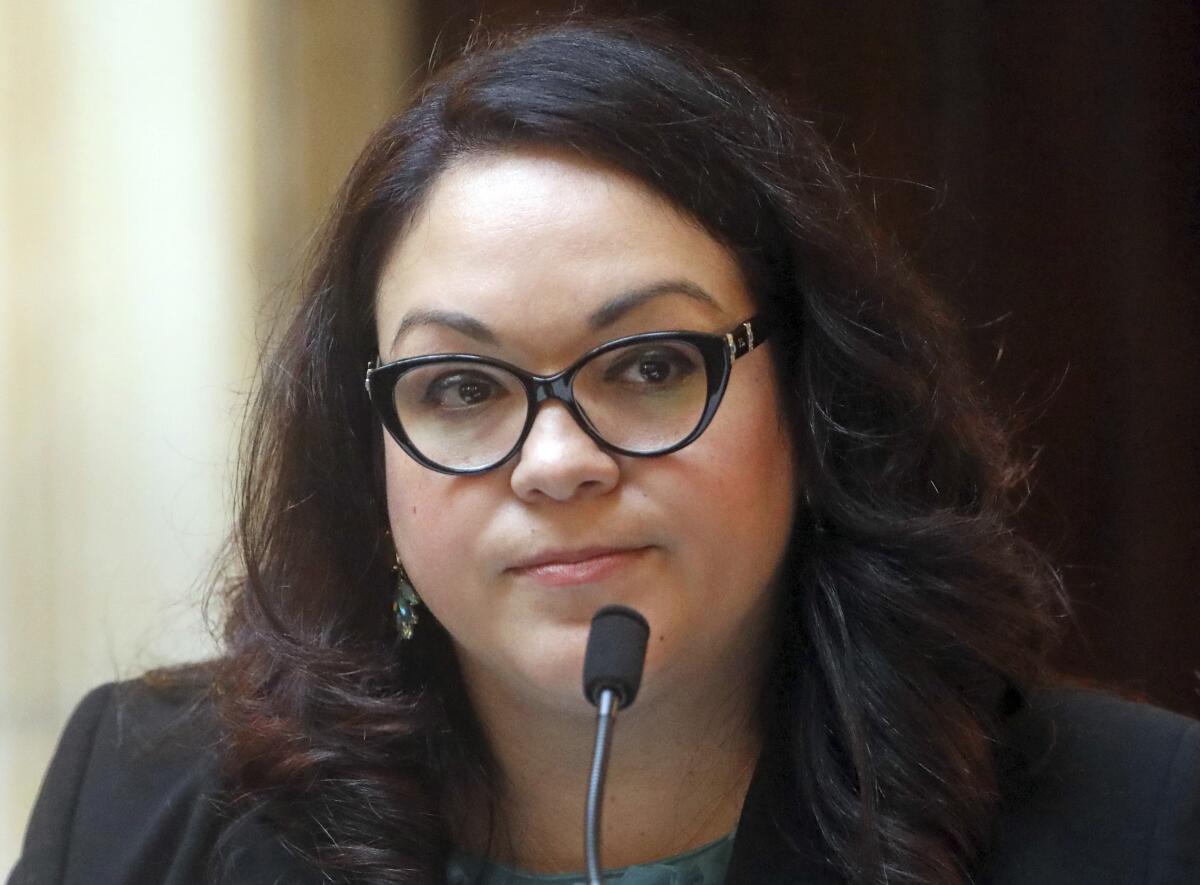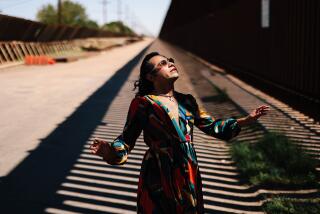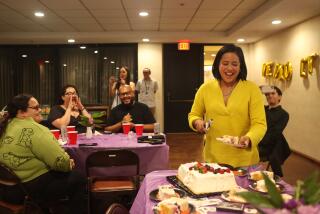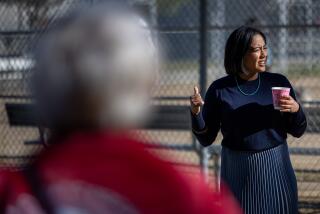In Salt Lake City, Luz Escamilla seeks to become the Utah capital’s first Latina mayor

Salt Lake City mayoral candidate Luz Escamilla began a recent meet-and-greet at a private residence with a quip she often uses to contrast the Utah she first encountered with the Utah of today.
In 1996, the Tijuana native walked into a Philosophy 101 class as a University of Utah freshman. “I was the only one with black hair — everyone else was blond,” she said to the knowing laughs of the multicultural crowd. “But things have sure changed.”
The state’s Latino population has doubled since 2000 to over 400,000 — making it the largest minority at more than 14% of Utah’s total population. The community has slowly established a political presence in Salt Lake, a liberal island in one of the reddest states in the country.
Latinos sit on the city council and local school board, a Latina is Salt Lake County’s sheriff, and 41-year-old Escamilla is in her third term as a Democratic state senator.
Now she is looking to make history on multiple levels.
A win on Nov. 5 would make her the first person of color to head Salt Lake, and one of a handful of Latinas ever in charge of a major American city. She’d also be the first mayor in 30 years who belonged to the Church of Jesus Christ of Latter-day Saints.
And she’d be the first to reside in Salt Lake’s West Side, the working-class neighborhoods split off from the rest of the state capital by Interstate 15 and long neglected by City Hall.
“We haven’t had anyone who’s been a strong voice,” said Sandra Hollins, who represents the area in the Utah State House of Representatives as its first African American female legislator. “But Luz definitely would. She’s already done it in the Capitol.”
“Luz represents a new kind of Salt Lake that dispels this national myth of what Utah’s supposed to be,” said Enrique Limón, editor of the local alternative newspaper, Salt Lake City Weekly. “She was more of a novelty at first, but she’s proven herself.”
The mayoral election comes at a critical time for the city, capital of the fastest-growing state in the country, but a place where urban woes such as air quality, homelessness and rising home prices are flummoxing residents not accustomed to them.
Escamilla’s opponent is 39-year-old Erin Mendenhall, a two-term councilwoman and fellow Democrat with a nearly identical platform — more affordable housing, better transportation programs, promises to better serve the West Side.
They split largely on how to mend the city’s long-antagonistic relationship with the state Legislature, with Escamilla claiming her experience there will help, and Mendenhall claiming her own experience in city governance will help more.
Polls have shown Mendenhall ahead in the race since August, when the two women advanced from an eight-candidate primary. The most recent Salt Lake Chamber of Commerce poll has Mendenhall ahead by 5 percentage points, with 21% of voters undecided.
“We’re at a crossroads,” Escamilla said in an interview from campaign headquarters, sitting in what used to be a walk-in flower cooler. A fast but precise talker, she peppers in Generation X lingo (of constitutional law, she says it’s “like, the bomb”) with long discourses on public policy. “We’re at a point where, if we don’t do it right, what kind of city will we leave our children?”
Married, with six children between her and her husband, Escamilla thought she’d always remain near the U.S.-Mexico border. She commuted from Tijuana to a San Diego Catholic high school her junior and senior years, and was close to her parents, both chemical engineering professors. She went to college in Utah because that “was a safe place for [them] to have their daughter move away from home in a foreign country.”
But soon after she arrived, Escamilla encountered another form of culture shock when she tutored children on the West Side.
“You have this dream of America,” she said. “But you see these limited resources for kids. It broke my heart to see kids struggling.”
Escamilla decided to stay, and became an American citizen in 2004.
Republican Gov. Jon Huntsman Jr. hired her in 2005 as director of the state Office of Ethnic Affairs based on her experience volunteering for social-justice causes. She probably would’ve remained a government worker if she hadn’t overheard lawmakers in a legislative committee meeting rail against “anchor babies” — children born in the United States to parents in the country illegally.
When Escamilla asked Democrats who were present why they didn’t say anything, they responded that those children weren’t their constituents.
“That’s when I realized that I can complain all I want,” she said, “or I can force uncomfortable conversations as a politician.”
In 2008, she ran for her current state Senate seat, beating the Democratic incumbent in the primary and a Republican in the general election. Since then, the Republican-led Legislature has passed more than 50 of Escamilla’s bills.
“She brings in conservatives and communities of color and gets us to a point where there can be consensus,” said state Rep. Angela Romero, who has known Escamilla since college.
Escamilla has tried to use that reputation as a bridge builder to appeal to voters beyond the West Side. Her campaign signs feature a beehive — a state symbol — embedded in her first name.
But that’s not necessarily an attribute in Salt Lake, the headquarters of the Mormon Church but also a city with an openly gay mayor, Jackie Biskupski, who has endorsed Escamilla.
Perhaps nowhere else in Utah would Escamilla have to fend off insinuations that she’d be a puppet of the state’s predominant religious group. But that’s the position she finds herself, especially after a blistering Aug. 17 Facebook post by a former mayor, Rocky Anderson, in which he claimed Salt Lake was “threatened with the prospect of a Mormon mayor ... who seems willing to do the bidding of the church.”
“I’ve always had people tell me, ‘Voters will never elect a Mexican. They’ll never elect an immigrant,’” Escamilla said. “Now they’re bringing up my religion. People have been trying to put me in a box forever. It’s not going to work. I’m not just one thing.”
At the meet-and-greet, she responded to questions about her faith by mentioning bills she has sponsored or backed that LDS leaders opposed, including loosening restrictions on alcohol sales and banning conversion therapy for LGBTQ individuals. She also noted the times she has worked with the church on immigration issues.
Escamilla’s pitch worked. The klatch lasted 20 minutes longer than scheduled due to all the interest. One woman, who pressed Escamilla more than others, whipped out her American Express card to offer a donation on the spot. Meanwhile, Jon Marshall, a biologist at Weber State, also left impressed.
“She has that intersectionality and experience that has helped her move among people with different points of view,” he said. “And it’s refreshing that, in a time of division between red and blue, that there’s someone like Luz.”
More to Read
Start your day right
Sign up for Essential California for news, features and recommendations from the L.A. Times and beyond in your inbox six days a week.
You may occasionally receive promotional content from the Los Angeles Times.







